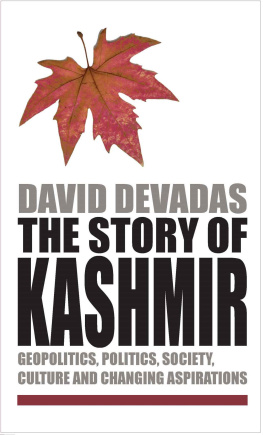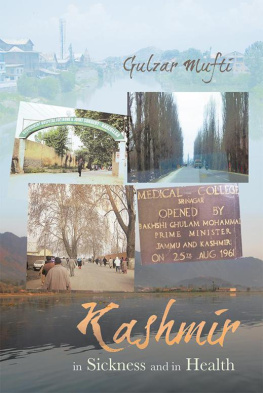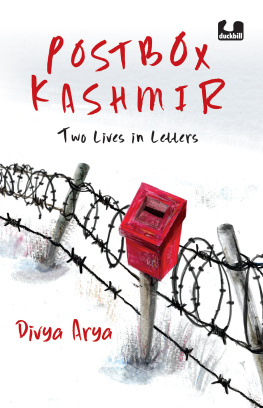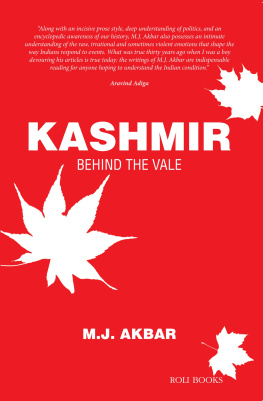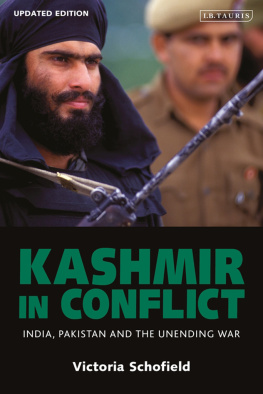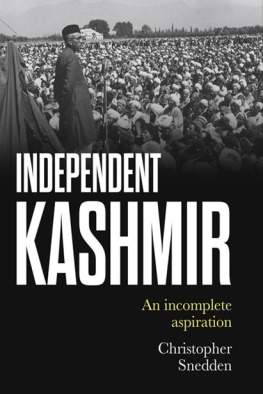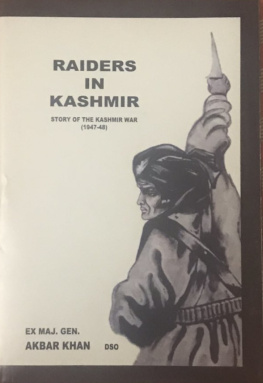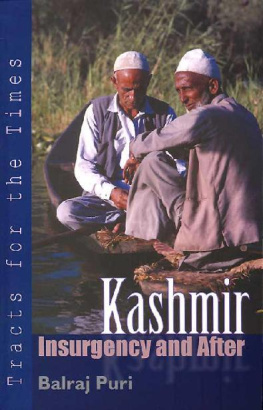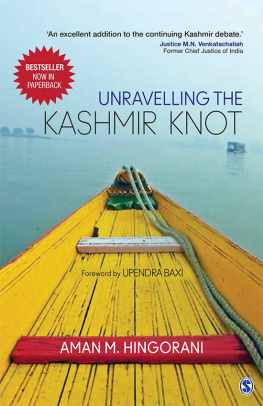David Devadas - The Story of Kashmir
Here you can read online David Devadas - The Story of Kashmir full text of the book (entire story) in english for free. Download pdf and epub, get meaning, cover and reviews about this ebook. year: 2019, publisher: David Devadas, genre: Politics. Description of the work, (preface) as well as reviews are available. Best literature library LitArk.com created for fans of good reading and offers a wide selection of genres:
Romance novel
Science fiction
Adventure
Detective
Science
History
Home and family
Prose
Art
Politics
Computer
Non-fiction
Religion
Business
Children
Humor
Choose a favorite category and find really read worthwhile books. Enjoy immersion in the world of imagination, feel the emotions of the characters or learn something new for yourself, make an fascinating discovery.
- Book:The Story of Kashmir
- Author:
- Publisher:David Devadas
- Genre:
- Year:2019
- Rating:4 / 5
- Favourites:Add to favourites
- Your mark:
- 80
- 1
- 2
- 3
- 4
- 5
The Story of Kashmir: summary, description and annotation
We offer to read an annotation, description, summary or preface (depends on what the author of the book "The Story of Kashmir" wrote himself). If you haven't found the necessary information about the book — write in the comments, we will try to find it.
The Story of Kashmir — read online for free the complete book (whole text) full work
Below is the text of the book, divided by pages. System saving the place of the last page read, allows you to conveniently read the book "The Story of Kashmir" online for free, without having to search again every time where you left off. Put a bookmark, and you can go to the page where you finished reading at any time.
Font size:
Interval:
Bookmark:
Published in 2019 by:David Devadas
daviddevadas@gmail.com
ISBN (Hardback) 978-9-38728-026-7ISBN (Paperback) 978-9-38728-027-4
David Devadas asserts the moral right to be identified as the author of this work.
Publishing facilitation: AuthorsUpFront
Typeset by Ram Das Lal, New Delhi (NCR)Cover design: Jayanto Banerjee
Authors photo: Javeed Shah
All rights reserved. No part of this publication may be reproduced, stored in a retrieval system, or transmitted, in any form or by any means, without the prior written permission of the AUTHOR. Enquiries concerning reproduction in full or in part, in any form, should be sent to the AUTHOR.
PART IPART IIPART III
T imeline
1931 to 1946: Coalescing of identity
1931Agitation of Kashmiri Muslims erupts
1932Muslim Conference formed
1939Muslim Conference converts itself into National Conference
1940National Conference splits; Muslim Conference reforms separately
1941Jamaat-e-Islami, a movement to regenerate Islam,established by Abul Ala Maududi
1945National Conference adopts Marxian Naya Kashmirmanifesto;
first Kashmiris get in touch with Jamaat-e-Islami
1946Sheikh Abdullah launches Quit Kashmir agitation against maharaja
viii TIMELINE
August 1947India and Pakistan come into being
Oct-Nov Pathan tribesmen invade state, Hari Singh accedes 1947conditionally to India; Indian Army arrives to defend
1948British get Nehru to take issue to United Nations,Abdullah becomes prime minister of state; UN Security Council passes resolution for plebiscite
1949Ceasefire agreement between India and Pakistan; line dividing the state created, Article 370 added to Indian constitution
1950United Nations representative for Kashmir appointed;Dixon Plan proposed, rejected by India and Pakistan
1951Constituent assembly formed, Abdullah deposes Hari Singh
1952India gives the state autonomy just short of independence; Abdullah covertly seeks US backing for independence
1953Abdullah arrested, G. M. Bakshi becomes prime minister of J & K
1955Plebiscite Front formed by Mirza Afzal Beg; adopts right to self-determination demand
1957National Conference splits for a few months.Democratic National Conference, led by Ghulam Mohammed Sadiq, formed
1958Abdullah released, re-arrested after a few months
1963Bakshi pushed to resign under Congresss Kamraj Plan, relic goes missing from Hazratbal shrine
1964Relic restored, G. M. Sadiq takes over as chief minister,cedes many of the states special powers; released from jailagain, Abdullah takes plan for joint management of valleyand surroundings to Pakistan with Nehrus knowledge; Nehru dies; Abdullah re-arrested after a few months
1965India-Pakistan war; Jammu and Kashmir National Liberation Front, precursor to the Jammu and Kashmir Liberation Front ( JKLF), formed in Muzaffarabad
1967Communal riots
1968Al Fatah, Kashmirs first guerrilla force, born
1971Second Indo-Pakistan war; Bangladesh is born
1972Simla Agreement; ceasefire line henceforth called the Line of Control
1975Abdullah returns to office, backed by the Congress
1977Abdullah wins elections
1982Abdullah dies; his son Farooq succeeds him as chief minister and leader of the National ConferenceFebruary 1988 Pakistan-sponsored training of militants begins
1983Communally polarized elections pit Congress against National Conference
1984Maqbool Butt hanged in Delhi; Jagmohan appointed governor; coup engineered against Farooq
1987Assembly elections rigged; Farooq Abdullah returns to power in alliance with Congress; new political group,Muslim United Front, defeated; Pakistan makes deal with JKLF to train and arm insurgents
May 1990
February to August 1990
1991-93
December 1992
July 1988First blasts
August 1988Zia-ul Haq dies; pro-Pakistan militant groups begin
July 1989General K. V. Krishna Rao replaces Jagmohan as governor
August 1989Formation of Hizbullah announced
Oct-Nov Rivals of JKLF begin to get arms and training; Hizb1989ul Mujahideen, Muslim Janbaz Force, Al Umar, and Students Liberation Force most important
December Rubaiya Sayeed, home ministers daughter, abducted;
1989five prisoners released in exchange
January 1990 Farooq Abdullah resigns; Jagmohan reappointed x TIMELINE
governor; Gowkadal massacre; Pakistan leadership decides to back Hizb-ul Mujahideen through Jamaate-Islami instead of pro-independence JKLFJamaat-e-Islami leader Ali Shah Geelani begins to take control of Hizb-ul Mujahideen; JKLF chief commander Ishfaq Majid killed
Mirwaiz Farooq assassinated; Jagmohan sacked;Governor G. C. Saxena begins to combat insurgency effectively through intelligence
Kashmiri Pandits killed by JKLF activists with gruesome cruelty; Pandits flee the valley as refugees;Yasin Malik and other senior JKLF commanders captured
Hizb-ul Mujahideen rules rural Kashmir, decimates other militant groups; Jamaat activists impose versions of shariat in pockets
ISI allows Pakistan-based Harkat-ul Mujahideen and Lashkar-e-Tayyiba to operate in Kashmir, but Hizb-ul Mujahideen retains primacy
March 1993 Krishna Rao replaces Saxena as governor; army presence increases dramatically from the following year
1993All Parties Hurriyat Conference formed
1994Yasin Malik released, announces JKLF ceasefire;Shabir Shah released, talks of including Pandits,Jammu and Ladakh
1996Assembly elections held; Farooq Abdullah returns to power
1998G. C. Saxena replaces Krishna Rao as governorFebruary 1999 Vajpayee visits Lahore, is received with fanfare and great warmth; stage set for peaceful resolution and close bilateral ties
May-Oct Kargil war; General Musharraf takes power in
1999Pakistan
Dec 1999Kandahar hijacking; three leading militants released
2000Clinton visits India and Pakistan. Hurriyat ginger group led by Abdul Ghani Lone tries for talks amid ceasefire; Geelani prevents peace moves
July 2001Agra Summit between Vajpayee and MusharrafSept 2001World Trade Center attacked
October 2001 Militants storm J&K assembly; Jaish-e-Mohammed claims responsibility
December Militants storm Indian Parliament; Indian and
2001Pakistani armies brace for war
May 2002Abdul Ghani Lone assassinated
October 2002 Assembly elections; Mufti Mohammed Sayeed becomes chief minister
2003India offers confidence building measures; Hurriyat splits
January 2004Pakistan agrees to Vajpayees proposal to make borders irrelevant; switches backing from Geelani to Mirwaizled Hurriyat
January 2007 Hopes for peace through self-rule get fillip with Hurriyat visit to Pakistan but lose momentum
July 2007Stone-pelting and clashes with police become a standard ritual after Friday prayers outside Jamia mosque in Srinagar
Nov 2007Gen Musharraf ceases to be Pakistan army chief
May-June Kashmiris agitate against land transfer to Sri Amarnath
2008Shrine Board, saying the Board comprised non-state subjects; N. N. Vohra becomes governor
Font size:
Interval:
Bookmark:
Similar books «The Story of Kashmir»
Look at similar books to The Story of Kashmir. We have selected literature similar in name and meaning in the hope of providing readers with more options to find new, interesting, not yet read works.
Discussion, reviews of the book The Story of Kashmir and just readers' own opinions. Leave your comments, write what you think about the work, its meaning or the main characters. Specify what exactly you liked and what you didn't like, and why you think so.

